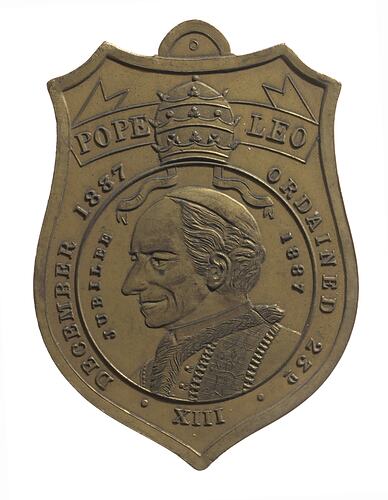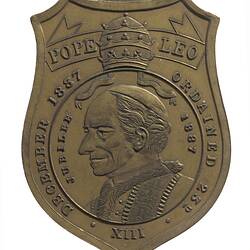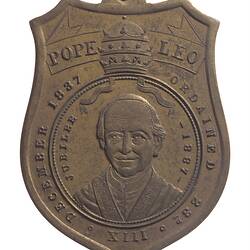Gioacchino Vincenzo Raffaele Luigi was the sixth of the seven sons of Count Lodovico Pecci and his wife Anna Prosperi¡Buzi. He was born on 2 March 1810 in Carpineto, Italy. At the age of eight he and his older brother Giuseppe were sent to study at the new Jesuit school in Viterbo. Gioacchino remained there for six years and gained that classical facility in the use of Latin and Italian. When the Collegio Romano was given back to the Jesuits in 1824, Gioacchino and his brother entered as students of humanities and rhetoric. He remained yet uncertain as to his calling, although his mother wished he would pursue an ecclesiastical career. He took up the study of theology as well as canon and civil law. In 1832 he obtained the doctorate of theology, whereupon he obtained admission to the Academy of Noble Ecclesiastics, and entered upon the study of canon and civil law at the Sapienza University. He was appointed domestic prelate by Gregory XVI in January 1837. He soon transferred to an office in the Ministry of the Interior for the Pontifical States. During the cholera epidemic in Rome he ably assisted Cardinal Sala in his duties as overseer of all the city hospitals. His zeal and ability convinced Cardinal Sala that he was fitted for larger responsibilities, and he finally responded to the urgings of his family and colleagues and was ordained priest on 31 December 1837.
He showed himself to be a very capable leader, and was appointed to increasingly responsible posts. He was appointed Archbishop of Perugia from 1846-1877 and Cardinal in 1853. On 20 February 1878 he became Pope.
Leo's election changed the course of the papacy. He was a modern man, and he worked, by preaching and writing, to bring Catholic attitudes into the modern era. His 1885 encyclical Immortale Dei explained the position of Catholics as citizens in modern secular, democratic states.The length of his reign allowed him to stock the college of cardinals with many skilled men.
Pope Leo XIII was politically-minded. He tried to bring French Catholics to support the republic. He refuted the French royalists' claim that they were exceptional Catholics, and the French anti-Catholics contention that the church was politically reactionary. He also opposed the anti-Catholic government of Italy. He managed to end the political struggle for the rights and self-government of the Catholic Church, carried out chiefly in Prussia and afterwards in Baden, Hesse, and Bavaria (Kulturkampf), in 1887. In 1879 he wrote Aeterni Patris, in which he declared the philosophy of Saint Thomas Aquinas official, and required its study.
In 1887 the Jubilee of the ordination of Pope Leo XIII was celebrated in Australia with the issue of a medal (NU 21077 and NU 21078).
In 1891 Leo explained the defficiencies of Marxism in Rerum novarum. He countered intellectual attacks on Christianity by advancing Thomism, with its insistence that there is conflict between science and faith, and founded the institute of Thomistic philosophy at the University of Louvain. Leo opened the Vatican secret archives to scholars, and he reminded Catholic historians of the importance of truth. He encouraged Bible study, set up the permanent Biblical Commission in 1902, and sponsored the Catholic University at Washington, DC, USA.
Pope Leo XIII died on 20 July 1903 of natural causes.
References:
Catholic Forum website http://www.catholic-forum.com/saints/pope0256.htm
New Advent website http://www.newadvent.org/cathen/09169a.htm
More Information
-
Keywords
-
Localities
-
Authors
-
Article types


